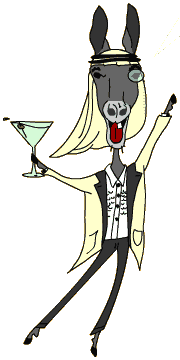
![]() O the Seleucids, have pretty teeth dear,
O the Seleucids, have pretty teeth dear,
and they show them, pearly white.
Just a hammer, has Judas Maccabee,
and he keeps it, out of sight.
When the Seleucids, bite with their teeth dear,
the revolution, start to spread.
Fancy wars though, fight the Hasmoneans,
so there's never, never a trace of dread.
In the temple, Hanukah morning,
lies a menorah, sans glamour,
someone's sneaking round the corner,
is that someone Mac the Hammer.
![]()
Look out ol' Judas Maccabee is back! You are one swinging donkey Methuselah -- I want you to meet two of my good Hasmonean friends from the Apocrypha, Mattathias and his son Judas.

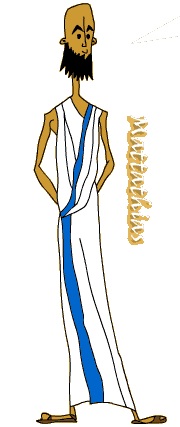
Thanks Bibledudes. I'm Mattathias, a priest from a family known as Hasmonean, named after one of my ancestors named Hashmonia. I lived in Modein a few miles northwest of Jerusalem, and had five sons, Judas here being the most famous of them.
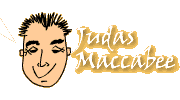
That's right dad. You might say we really hated Hellenism, especially in the hands of this guy named Antiochus IV, or Antiochus Epiphanes (god manifest)-or Epimanes (madman) as I liked to call him. If you remember, when Alexander the Great died, his generals divided his kingdom, with Seleucus ruling over Syria-Palestine. Antiochus Ephiphanes was one of these Seleucid rulers, and boy was he ever bad news.
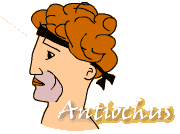
I think I can speak for myself thank you. I of course am the great Antiochus Epiphanes, and I was only trying to bring some civilization to these backwoods hillbillies. I thought that all would benefit from Hellenization. While Alexander for the most part let his conquered vassals practice religion as they saw fit, I, you might say, implemented Greek culture more vehemently. Under my direction, we built a gymnasium in Jerusalem, so now, instead of studying Torah, young Jewish men could get naked, put on olive oil, and wrestle each other. I also outlawed that horrid practice of circumcision, and set up an altar on the Temple to Olympian Zeus, so that the Jews might be more civilized like other countries reaping the benefits of Hellenization.

So you see now why we called him Antiochus Epimanes! I mean come on, Antiochus, circumcision commemorated our covenant with God. Now, thanks in large part to you, many of our male youths were ashamed by the effects of this ritual, and sought operations to make it look like they were never circumcised in the first place. Antiochus taxed us to death, forbid us to sacrifice in the Temple's sanctuary, and after he stole many of the Temple's treasures, Antiochus started sacrificing pigs, an animal more ritually unclean than all others for Jewish people. That's when I had had enough and killed this Hellenized Jewish guy on an altar in Modein. Because we knew Antiochus and his forces would want to see us dead after this pivotal event, we all fled to the hills. Steadily more and more dissatisfied Jews joined our bands, and we formed an army. On my deathbed I gave control of our forces to Judas. Tell them about your nickname son.
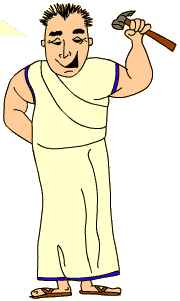
Yeah, it's pretty cool. They thought I was so tough, they called me Maccabee, the Aramaic word for "hammer." So nowadays people refer to our dynasty and time period as either Hasmonean or Maccabean. Well, our army won several battles, and really infuriated Antiochus. Finally we retook the Temple in Jerusalem, but as it had become ritually unclean, we had to re-purify it, which we completed in 165 BCE. This was exactly three years after Antiochus had desecrated the Temple. Now we renewed sacrifices upon the altar, and we celebrated for eight days. This is the origin of Hannukah, a Hebrew word meaning dedication. The famous story about how there was only enough ritually clean oil for one day, but it miraculously burned for eight, is a story that arose later. Same with the dreidal.

Well under the leadership of my son da' Hammer, as well as my other kids, we won several key battles. Antiochus Epiphanes finally died in 164 BCE, but his Seleucid successors were nearly as awful as him, so our struggle continued. We allied with an up-and-coming super power Rome, and we finally took over Judea. Well, Judas died in battle, and my son Jonathan took over, then Simon. Simon was murdered, along with his two sons, in 134 BCE. His only surviving child John Hyrcanus then began to reign as leader of the Jews, and at this point 1 Maccabees leaves off.

To fill in the gaps between the end of 1 Maccabees and the New Testament, we've invited our friend Flavius Josephus, the famous historian and author of The Antiquities of the Jews and The Jewish Wars. Thanks so much for coming Josephus.
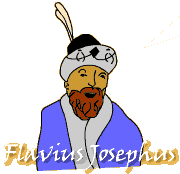
You're quite welcome BibleDudes. Without going into too much detail, I would like to point out that the Hasmonean leadership of Judea continued until 37 BCE, when Rome wanted more direct control of the province. So they appointed Herod the Great leader of Judea. But Hasmonean influence continued for some time, as Herod married a Hasmonean woman named Miriam. But one day in a fit of rage, Herod killed her and their four kids. Then, with the Hasmoneans gone, Herod ruled Judea until 4 BCE when he passed away. Hey, is that you, Jason of Cyrene?
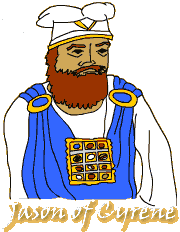
Sure is Josephus. I was the high priest under Antiochus Ephiphanes, and furthermore, I'm the alleged author of Second Maccabees. My book isn't exactly as historical in purpose as First Maccabees, but instead, I basically put a theological spin on the same events in history. Moreover, in my writings you can really see the evolution of Jewish thought under the influences of Hellenism. For example, I might actually be the first person who celebrates the lives of martyrs in my writings, and I also argue that saints in heaven interceded for people here on earth. One of my most famous stories concerns the martyrdom of this pious woman right here.
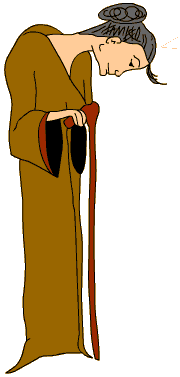
Thanks Jason of Cyrene. While I don't have a name, my story is known as The Martyrdom of Seven Brothers and Their Mother. I of course, am the famous mother. You see, King Antiochus Epiphanes had me and my kids arrested and ordered us to eat pig. Well, as you know, Jewish dietary laws forbid such a thing, and Hellenism be cursed if it meant turning our backs on our heritage. Antiochus' henchmen took one of my sons and fried him in a large pan in front of me and his siblings. But we refused to give in to their demands. They killed my second son by tearing the skin off of his head, and proceded to torture and kill the rest of us. Finally, after seeing all seven children of mine die, I remained steadfast, and then bravely met my death.
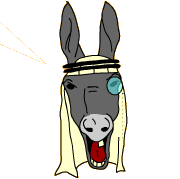
Ick! So much blood and guts. Why would you write such a story in Second Maccabees, Jason of Cyrene?
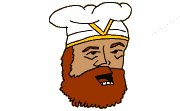
To dramatically make the point that life was hard during the Diaspora. Our Jewish customs and heritage were constantly in danger of disappearing. The story of The Martyrdom of Seven Brothers and Their Mother gave Jewish people hope to stand up for their beliefs and not throw away thousands of years of our customs.

Two books down, two to go BibleDudes. And come to think of it, Third Maccabees is sort of a stupid title for the next book. It's the story of King Ptolemy IV in Egypt, and how he persecuted Jews in the third century BCE, 50 years before the Maccabees started the revolution in Judah.
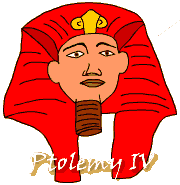
Look, I'm Ptolemy IV, and I could care less about the accuracy of Apocryphal titles. All I know is that I wasn't such a big fan of Judaism. It all started when I visited Jerusalem, and tried to enter the Temple. Well, some miracle happened, and the next thing I knew, I was thrown outside -- Imagine, me, the king of Egypt, repulsed by the Judean God! Well, I returned to Egypt and held a grudge against the Jewish people living in Alexandria Egypt. I tried to force them to worship Dionysus, and if they refused, I tortured them to death. Then this old priest named Eleazar prayed, and you know what? I mellowed out, repented, and came to be a patron for the Jews in Egypt.

What a marvelous story, King Ptolemy. Might I point out that while Third Maccabees is canonical for Eastern Orthodox churches, it is not for Roman Catholics. Finally, I would like to take a minute, my darlings, and tell you about the amazing book known as Fourth Maccabees. While it was never canonized by any religion, it is contained in some Greek Bibles. It consists of expanded stories, most notably a version of The Martyrdom of Seven Brothers and Their Mother that has much more detail. It's main point would be that religious reason is much preferred over physical passion.
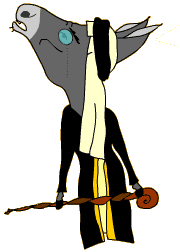
Look talking camel ... I'm 969 years old, and my veterinarian told me to not so much as talk about physical passion. Can we please move on to the next chapter, the final one for the Apocrypha, and we'll look at Psalm 151?